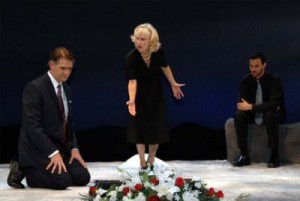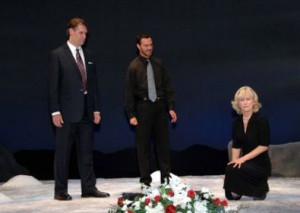
It has been said that there is no greater loss than that of a child a parent has given life to. Imagine, then, how much more devastating the pain must be when that parent feels responsible for his or her child’s death, and how much greater still if the child’s death has occurred at his or her own hands.
This is the dilemma faced by Alex and Ruth McCormick, still reeling from the just-days-ago suicide of their 25-year-old son Andrew. Alex and Ruth are Mormons, you see, and so had Andy been until his excommunication for the “abomination” of homosexuality.
Arriving at Andy’s dug but still empty gravesite before the rest of the mourners, Alex suddenly cries out to Ruth that the entire funeral service was a lie, and that he is going to give his son a proper funeral here and now, even if the only witnesses will be the trees which surround them.
Thus begins Carol Lynn Pearson’s heart-wrenching, thought-provoking drama Facing East, now being given its second Los Angeles area production, and an absolutely superb one, at International City Theatre in Long Beach.
Alex McCormick (Christian Lebano) is a nationally known radio host, famous for imparting 60-second doses of parental wisdom as “One-Minute Dad,” a fact which makes Andy’s suicide even more difficult to him to accept. How could a man so skilled at giving advice (“Put a note in your child’s lunchbox which says ‘I love you just the way you are’”) have failed his own son so completely?
Not true, protests Ruth (Terry Davis). She and Alex loved Andy as much as if not even more than their other two children. They did everything for him, everything to cure him of his sin, from prayer to reparative therapy. It must have been “that man,” their son’s lover for the past year, who corrupted him, who made him feel so ashamed of himself that he took a gun and ended his life in a flowerbed next to the Salt Lake City Mormon Temple.
As Andy’s unplanned funeral continues, both parents flash back to moments in Andy’s growing up. Alex recalls the time he told his son the facts of life, and remembers a hunting trip they took together. Ruth remembers teaching Andy to how bake bread and weed a garden. Though Alex looks for ways in which he might have failed his son, Ruth steadfastly refuses to accept any blame. True she may have “smothered him” (oh how these outdated, disproved psychiatric theories hold on), but ultimately it was Andy’s own refusal to renounce Satan that brought about his suicide. If Ruth was able to overcome an addiction to Percodan (with Andy’s help), how is it that he had been unable to overcome his own addiction to homosexual acts?
Seen as an “issues” play, Facing East has its flaws. These gay=sick=sin arguments have been trotted out so often that audience members who’ve heard them far too many times before may well tune out. In addition, Pearson’s language occasionally finds itself somewhere between poetic and stilted. Still, even though the playwright’s aim in writing Facing East may have been to change hearts and minds (something which the play may very well succeed at), the drama’s power comes from Alex and Ruth’s undeniable agony, and from their feeling of powerlessness against the irrefutable truth that they will never see their son again.
About halfway through Facing East’s 80 or so minutes, a third character arrives at Andy’s graveside, his partner of the past year, Marcus (Daniel Kash). Though Ruth cannot bring herself even to look at his face, going so far as to block the sight of him with an upheld hand, Alex begs Marcus to stay, and to tell him about who his son really was.
If Facing East has been powerful so far, Marcus’s appearance ups the emotional impact and then some. Unlike the monster Ruth has conjured up, the Marcus she and Alex meet today is a man Andy called his “guardian angel,” someone who had saved him from a suicide he was about to commit on the day they met, a man who had often made Andy look at himself in the bathroom mirror and repeat and repeat, “God loves me and I am gay. God loves me and I am gay.” Though Ruth keeps her barriers high, Alex drinks in Marcus’s every word, finally getting a glimpse of the man Andy had become and could still have been had he not lived with such unbearable guilt.
ICT’s is the third production of Facing East I’ve seen and reviewed over the past year, but the first to truly do Pearson’s drama full justice. Previous productions have each featured one performance which towered over the others, and in one particular case, a performance that was all surface grief and no real pain. Not so here. Every moment of Lebano, Davis, and Kash’s performances is honest and unforced, aided by the subtle, superb direction of Shashin Desai.
Besides looking and sounding the part of a national radio celebrity, Lebano is the first actor to play Alex who really made me believe in the play’s central conceit, that of an impromptu funeral with no one to witness but the trees. Lebano’s pain is so palpable that an honest funeral to erase the lies of the official one becomes a moral imperative. That Lebano keeps Alex’s agony always there just below the surface throughout the play’s running time is a feat only an actor of his gifts can manage, and because tears are never far from the surface, Alex’s final breakdown is absolutely believable … and cathartic.
Davis matches Lebano every step of the way. Like her costar, she looks the part, and were Ruth not in mourning, her sunny blond looks and smile would be the perfect advertisement for Mormon motherhood. Like Lebano, Davis’s emotions are never anything less than real. What makes her role in some ways the tougher one is that Ruth’s words are often less from the heart and more from the Book Of Mormon. It takes an actress of Davis’s caliber to make these lines sound believable, and because her Ruth truly believes what she is saying, her blindness to the real reasons for her son’s death is all the more tragic.
Completing the excellent acting triad is Kash, who never for a moment lets us doubt that Marcus is a out-and-proud contemporary gay man, that his love for Andy was/is deep and sincere, and that his mourning is every bit as authentic as Alex and Ruth’s. Torn between grief, guilt, and anger, Kash shows us every part of Marcus’s broken heart.
Director Dasai, working with the always brilliant lighting designer Jared A. Sayeg, stages Facing East’s frequent flashbacks seamlessly and highly effectively. Lights up on the actor recalling Andy’s childhood, lights down on the actor portraying his or her son. It sounds simple, but with Sayeg’s artistry it’s beautiful, and it works, as do all of the designer’s lighting choices. Bill Georges has created a beautiful sound design including original music.
Stephen Gifford’s cemetery set is gorgeous to look at. The ground appears to be covered with salt and what appear to be mounds of salt take the place of gravestones. (I’m guessing it’s salt and not snow, as ICT’s production is set in actual time. At the June 18 performance, the date of Andy’s suicide was June 14, 2009.) Could this be because of the play’s Salt Lake City setting, or is it just meant to look pretty? Whatever the case, it does. White and red flowers are strewn at the head of Andy’s open grave. There is a pair of large boulders at opposite corners of the stage. There are no trees in sight, though. Sayeg’s exquisite lighting casts variously hued patterns across Gifford’s big sky panorama rising above the mountains surrounding Salt Lake City.
Now comes the strange part. Suspended above the stage is an enormous cocoon-like object which looks like a cross between a hornet’s nest, a beehive hairdo, a whirlwind, and a huge clump of tumbleweed. Throughout the play, I kept wondering what it was supposed to signify, eventually guessing that it was Andy’s spirit still hovering above the people who meant the most to him. Ultimately, though, this “thing” distracted from rather than enhanced Pearson’s words.
That pickiness aside (Gifford remains one of our most gifted, inspired young scenic designers), ICT’s production of Facing East is beautiful indeed. Thursday’s audience was filled with senior citizens, and I couldn’t help thinking of polls which indicate that voters over-65 are the least likely to “approve” of homosexuality or to support marriage equality for gays and lesbians. These were precisely the theatergoers whose hearts playwright Pearson is seeking to touch, and the loud applause at curtain calls would seem to indicate that she, and the production itself, have succeeded in this task.
International City Theatre, Long Beach Performing Arts Center, 300 E. Ocean Blvd., Long Beach.
www.ictlongbeach.com
–Steven Stanley
June 18, 2009
Photos: Shashin Desai




 Since 2007, Steven Stanley's StageSceneLA.com has spotlighted the best in Southern California theater via reviews, interviews, and its annual StageSceneLA Scenies.
Since 2007, Steven Stanley's StageSceneLA.com has spotlighted the best in Southern California theater via reviews, interviews, and its annual StageSceneLA Scenies.







 COPYRIGHT 2024 STEVEN STANLEY :: DESIGN BY
COPYRIGHT 2024 STEVEN STANLEY :: DESIGN BY